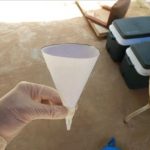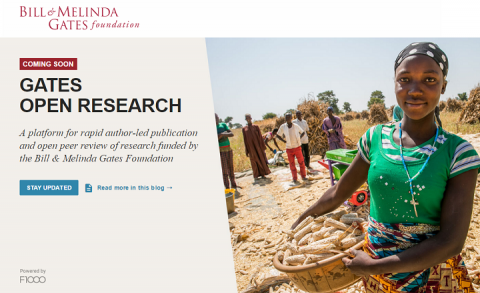You are what you eat – detecting diseases carried by mosquitoes
| 8 November, 2017 | Lisa Reimer |
|

|
A guest blog from one of the first authors on Gates Open Research

Image credit: James D. Gathany/CDC - public domain
Gates Open Research, a new publication platform for grantees of the Bill & Melinda Gates Foundation, has published its first articles this week. One of the first articles to be published there is by Lisa Reimer and colleagues and is now awaiting peer review. Here, she describes their work in monitoring pathogens present in mosquitoes from their feces captured using a superhydrophobic cone and why they chose to publish on Gates Open Research.
With emerging and resurgent vector-borne diseases threatening the health of people around the world, we are exploring novel approaches to support low-cost, sensitive disease surveillance.
Following the discovery that mosquitoes excrete the DNA of the pathogens that were present in the bloodmeal – a dry powder made from blood, we set out to address some of the operational challenges of using this as a surveillance platform. How exactly should we collect and preserve mosquito feces, and could this be applied to a passive collection method in the future?
What parasite DNA tells us
We have submitted to Gates Open Research to publicise our results quickly and spur new collaborations with industrial and academic partners to take this approach forward.
Xenomonitoring is the detection of parasite DNA in mosquitoes and serves as a proxy for the infection prevalence in humans. The advantages of xenomonitoring apply to diseases where there is low treatment seeking behaviour or a high number of asymptomatic individuals, and where the response to infection includes community-wide control or treatment, such as increasing vector control following an arbovirus outbreak, or mass drug administration for malaria or helminth infections. Not only is this a non-invasive sampling strategy, but mosquitoes are great at ‘sampling’ from individuals that are highly exposed to bites, including people who do not adhere to interventions or volunteer for screening.
An effective low-cost method of surveillance
So why are we interested in collecting and screening mosquito feces rather than whole mosquitoes? In previous work, co-authors have shown that feces screening allows pool sizes up to 500 mosquitoes, which will significantly reduce the costs and time associated with xenomonitoring. This approach works with non-vector mosquitoes as well, which sometimes are easier to catch and in higher abundance than the vector species responsible for transmission.

In this study, we developed a mosquito holding cup that deposits all the feces into a collection tube or onto a filter paper (formulated to protect nucleic acids). It is designed to be used in combination with currently available trapping methods whereby mosquitoes are temporarily held in the cups prior to processing for other purposes. We have demonstrated successful amplification of filarial DNA, trypanosome DNA and malaria DNA from mosquitoes exposed to positive bloodmeals. This method is ready for field use although we are interested in further development to apply this principle to a passive collection technique such as resting boxes or sugar feeding stations.
Why publish on Gates Open Research?
This research was supported by the Bill and Melinda Gates Foundation (Principal Investigator: Nils Pilotte) and the UK Medical Research Council (Principal Investigator: Lisa Reimer). We have submitted to Gates Open Research to publicise our results quickly and spur new collaborations with industrial and academic partners to take this approach forward.
Gates Open Research provides all Gates Foundation-funded researchers with a place to rapidly publish any results they think are worth sharing. All articles benefit from immediate publication, transparent refereeing and the inclusion of all source data. If you are a grantee of the Gates Foundation you can find more information about how to publish on Gates Open Research here.

|




User comments must be in English, comprehensible and relevant to the post under discussion. We reserve the right to remove any comments that we consider to be inappropriate, offensive or otherwise in breach of the User Comment Terms and Conditions. Commenters must not use a comment for personal attacks.
Click here to post comment and indicate that you accept the Commenting Terms and Conditions.